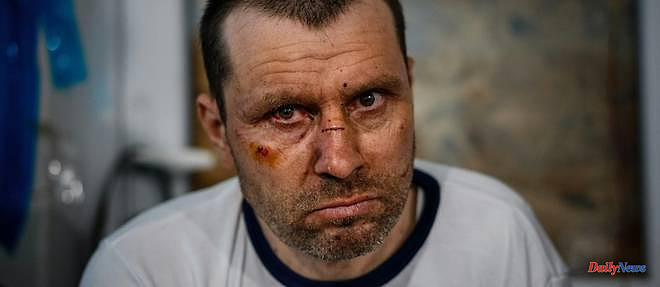At the bottom of the gaping wound, we see the heart of the Ukrainian soldier beating. The injured young man arrives from Bakhmout. A bullet went through his left arm, his chest, and stuck in his right arm.
It's 9:00 p.m. About fifteen doctors, nurses and orderlies are busy around the soldier and five other wounded combatants, transported together to the first aid center of the 93rd mechanized brigade.
The medical antenna is in a village about fifteen kilometers from Bakhmout, the epicenter of bloody fighting for months in eastern Ukraine.
"It's been difficult for a month (...) there were days when there were 100 injuries, and others when there were 50 to 60 (...) It all depends on what is happening in Bakhmout," Volodymyr Pihulevsky, a 38-year-old surgeon and member of the medical team, told AFP.
"It's really difficult for our guys there too. I can't even imagine what it's like to be there, because it's very scary," he added.
The doctor knows what he is talking about. The medical unit left Bakhmout at the end of December, where the 93rd brigade is at the forefront of the fighting, before attempting to relocate there at the end of January. But the bombardments there were too intense and they had to give up.
Four medics from the unit have been killed since the Russian invasion began more than a year ago.
Lying in his underwear on one of the five stretchers in the treatment room, the young man injured in the chest did not say a word.
Near him a doctor, an anesthetist and two nurses tend to his five wounds in the chest and arms.
"We checked to see if there was a pneumothorax. If it was necessary to insert a tube or do a puncture. It wasn't, so we just treated the wound, stopped the bleeding and did a bandage", summarizes Volodymyr Pihulevskiï.
“If it had been a little deeper, it would have been much worse,” he adds.
Once treated, the soldier is quickly sent to a hospital in a nearby large city, as his comrades arrived with him.
The medical antenna is a stabilization point, positioned between the front line and the hospitals of large cities. Each unit of the Ukrainian army has its own centers, located near the combat zones.
In these places, "our objective is to save lives and to send the wounded alive to the hospital", explains doctor Pihoulevskiï.
The first wounded barely left, a wave of six others arrived at the medical office around 10:30 p.m.
All of them received shrapnel. Most held positions in trenches near Bakhmout. Extreme fatigue can be read on the faces.
Some were injured in the morning or during the day. They can only be transported to the center after dark.
During the day, the Russian forces regularly target vehicles circulating on the few traffic routes still passable in the area.
"For several days, nothing has happened during the day, because the vehicles are targeted. The wounded are therefore only evacuated in the dark," said Lyudmyla Symchenko, a 55-year-old anesthesiologist.
The driver of an armored personnel carrier has a bloody left hand, his fingertips are torn off.
A soldier in his twenties received a piece of shrapnel behind his head which went through his helmet. Doctors consider it risky to attempt to remove the piece of metal. The young man moans as soon as he moves his head.
Two others have shards stuck in their backs. They wince in pain when the doctors triturate their bodies ruthlessly to find and then remove under the skin the bits of scrap metal that are still lying around.
Lyudmyla Symchenko firmly told one of the patients to straighten his arm to give him an injection.
"A lot of soldiers have suffered trauma from the bombardment and therefore don't immediately understand" what is being asked of them, she says.
"Yesterday, for example, we had trouble taking a man's ax (which he had brought with him). He was in a state of shock, and he did not let go of the ax from his hands. was his reaction to stress," says the caregiver.
Slightly injured in the shoulder by shrapnel, Denis, 25, is waiting to be taken to hospital. He is a member of a paratrooper unit not belonging to the 93rd brigade. He was digging a trench south of Bakhmout at the end of the day.
"A drone was above us, and we didn't know if it was ours or the enemy's," then they were targeted by mortar fire.
He recounts the wounded, the dead and the lack of manpower within his unit. "We had a lot of losses. We were 124 fighters at the start of the war, we are less than 80," he said.
According to him, today, "there should be 11 to 12 soldiers per team, but it turns out that each team has only 7 to 8 left. Therefore, all the wounded are trying to return to the unit as soon as possible".
Shortly after midnight, calm suddenly returns to the treatment room. All the wounded were taken to hospitals far from the front, and the arrivals ceased. Some 70 soldiers have been treated there in the past 24 hours, doctors said.
Sitting on chairs, silent, the fifteen caregivers have their eyes riveted on their mobile phones.
"Our only distraction is the phone. We don't go out, we're here 24 hours a day. We sleep here, we eat here, we work here," said Lyudmyla Symchenko, her eyes red with fatigue.
06/05/2023 18:18:31 - Près de Bakhmout (Ukraine) (AFP) - © 2023 AFP












